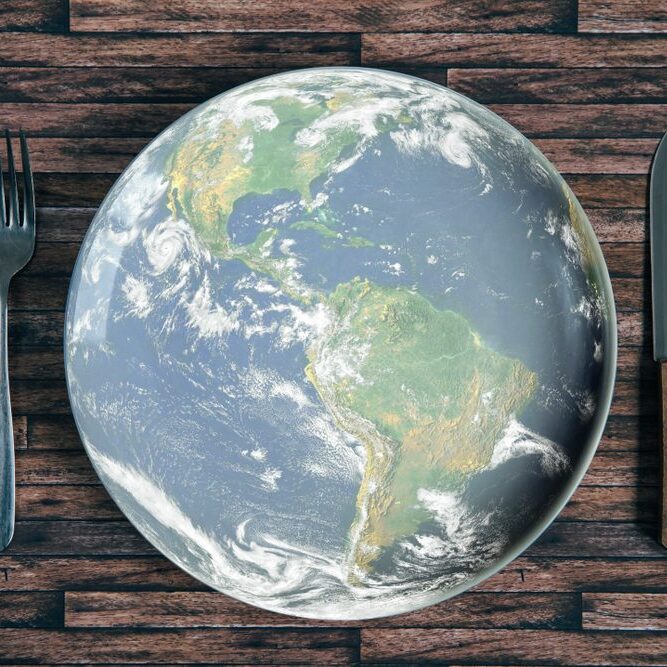
ProVeg shares 50 quickfire reasons to prioritise plant-based diets for a sustainable future this World Environment Day – and every day!
It’s 50 years since the famous 1972 Stockholm Conference which put sustainability on the global agenda, designated 5 June as World Environment Day, and created the United Nations Environment Programme.
In recognition of this significant anniversary, World Environment Day 2022 reprises the theme of the 1972 conference: ‘Only One Earth’. The campaign highlights the need to reset the balance with nature through transformative changes in how we eat, live, work and move.
One of the most powerful opportunities is to shift how we eat – especially in countries with high consumption of animal products. It’s this message that food awareness organisation ProVeg International has taken to the accompanying ‘Stockholm+50’ high-level conference this week.
The power of the plate
“Food system change needs to be embraced if we are to make progress towards our global goals,” said Raphaël Podselver, Head of UN Advocacy at ProVeg. “Transitioning to a plant-rich diet is just one of those effective solutions, releasing the huge pressure that global food systems place on our planet and its finite resources.”
Summarising the huge potential of a plant-based transition, here are 50 reasons why ProVeg are advocating for policymakers, businesses and citizens to embrace this shift, on World Environment Day and every day.
- The world’s scientists have spoken. The latest report from the Intergovernmental Panel on Climate Change has called for a shift to plant-based diets to tackle the climate crisis.
- Reducing emissions. Global greenhouse gas (GHG) emissions from animal agriculture are twice those from plant-based diets, so policies need to be pushed that encourage plant-based nutrition.
- Not much, for a lot. Worldwide, meat and dairy provides just 18 percent of calories consumed, but uses 83 percent of global farmland. Plant-based diets can address this imbalance.
- Avoiding collapse. A study from Bonn University published in April stated that rich countries will need to reduce their meat consumption by up to 75 percent to meet international climate targets and avoid ecosystem collapse.
- A lot of people. Reducing resource-intensive meat production will help us to feed the 10 billion people expected to be living on our planet in the year 2050.
- Food not feed. Researchers have found that growing food exclusively for direct human consumption, rather than as animal feed and for biofuel production, could potentially increase available food calories by as much as 70 percent, which could feed an additional 4 billion people.
- Save the trees! 80+ percent of the world’s deforestation is related to our current food
- New food on the barbecue. Despite high per capita meat consumption in Australia, global agri-food companies are investing in Australian plant protein.
- Worth a fortune. If the moderate current growth of the Australian plant-based meat market continues, the market is predicted to be worth AU$3 billion in retail sales by 2030.
- Erasing grazing. Between 1990-2005, 71 percent of deforestation in Argentina, Colombia, Bolivia, Brazil, Paraguay, Peru and Venezuela was due to increased demand for pasture for cattle.
- For the animals. The UN has already passed a historic resolution earlier this year, commissioning a report on the link between animal welfare and sustainability. Progress is being made!
- We’re on a roll! In Europe, 40 percent of consumers are already actively reducing their consumption of animal-based products (either identifying as flexitarian, pescetarian, vegetarian, or vegan), and the numbers are similar in Australia and New Zealand.
- Cutting back. In Germany alone, 51 percent of people reduced their meat consumption last year.
- Young people are on side. ProVeg launched an international Youth Board this year to help us campaign for food system change. These people represent the many millions of younger people who are passionate about tackling climate change.
- Travelling light. GHG emissions from transportation make up a small amount of the emissions from food. What you eat is far more important than where your food travelled from.
- Tame the methane. Reducing our meat consumption will help to significantly bring down methane emissions. Animal agriculture is responsible for 32 percent of human-caused methane emissions, according to UNEP.
- Stabilising effect. Rapid global phase-out of animal agriculture has the potential to stabilise GHG levels for 30 years.
- Tasty alternatives. Plant-based meat alternatives are as tasty as their animal-based counterparts, so flexitarians are less likely to feel something is missing from their plate.
- Good for you. A plant-based diet has the potential to improve people’s health and is increasingly being recommended by scientists and nutrition societies around the world.
- Doesn’t go viral. A shift to plant based diets has the potential to reduce the risks of the transmission of zoonotic diseases and future pandemic outbreaks, like COVID 19.
- It’s classified. Processed red meat has been classified as carcinogenic to humans by WHO’s International Agency for Research on Cancer (IARC) so reduction is highly advisable.
- Also classified. Red meat has been classified as “probably carcinogenic to humans” by the same UN body, IARC.
- It’s a booming business. Sales values of plant-based meat in Europe amounted to €1.4b in 2020, with a growth rate of 68 percent over the past two years, according to the latest ProVeg report on plant-based alternatives to meat.
- Projected growth. Globally, the plant-based meat market is estimated to be valued at $4.3 billion in 2020 and is projected to reach $8.3 billion by 2025.
- Meeting the meat industry. IFFA, the international meat fair, this year welcomed alternative protein groups – including ProVeg – for the first time in the fair’s 70 year history.
- More inclusivity needed. About 68 percent of the world’s population is lactose intolerant so there is a great need to encourage plant-based milk in schools to promote inclusivity.
- Thirst for change. One litre of cow’s milk requires over 22 times more water, roughly 12 times more land, and emits three times more GHGs than a litre of soy milk.
- Plant milk has fans in Congress. US Senators are fighting for fair treatment of plant-based milk to ensure FDA guidance does not impose labelling requirements different from those for animal-based milk.
- Milking it. Revenue from the global non-dairy milk sector is set to reach more than $38 billion by 2024, growing at a Compound Annual Growth Rate from 2018 of 14 percent.
- Farmers want change. Farmers want to play their part in helping to mitigate climate change.
- The future is more cultured. Cultivated meat is a potentially viable replacement for conventionally-produced meat and has already received huge amounts of investment.
- China welcomes change. With 1.3 billion people, China has highlighted alternative proteins such as plant-based, fermented and cultured meat in its latest five-year agricultural plan.
- The money’s there.The Dutch government made progress in April when it earmarked €60 million to support cellular agriculture development. In Australia, plant protein production received a AU$378 million boost in March.
- Singapore is leading the way. In 2020, Singapore became the first country to approve the sale of cultured-meat products for human consumption.
- Europe’s catching up. The EU’s European Food Safety Authority published new guidelines in March 2021 specifically for novel-food applications from cultured-meat producers.
- Big year for the US? The US FDA is reviewing its regulatory requirements, meaning that cultured meat could hit retail shelves in late 2022.
- A large stake. By 2040, a projected 60 percent of meat will be created from cells grown within bioreactors and sold across grocery stores and restaurants worldwide.
- Culture club. Globally, there are already 99 companies worldwide developing cultured meat components, services, and end-products.
- Fast pace of growth. According to Kearney, cultured meat will outgrow novel plant-based meat replacements between 2025 and 2040, with an annual growth rate of 41 percent.
- Ministers speak out. It’s a sign of the times when not only the health minister of a country, but also the agriculture minister says that people should be reducing their meat consumption.
- Going to school. In the UK, five million plant-based meals have been provided and some local councils are introducing plant-based meals to meetings.
- Bring down the nitrogen. The Flanders government has committed €3.6 billion until 2030 to bring down nitrogen emissions, including reducing the number of pigs in Flanders by 30 percent by 2030.
- Amsterdam rocks. Amsterdam hopes its citizens will be enjoying 50 percent plant-based meals by 2030.
- Fewer animals on the plate. Over a quarter of Dutch people hope that one day we will no longer use animals as food at all.
- Food security for all. Plant-rich diets contribute to global food security for all.
- We can make headway. Remember the 1987 Montreal Protocol? It banned the use of ozone-depleting substances: 97 percent of the damaging substances have since been phased out.
- The world can agree. In 2015, the UN ‘COP21’ climate conference resulted in the milestone Paris Agreement. This agreement, signed by 195 countries, is the first global and legally binding climate deal.
- Growing concern. While health remains the top driving force, environmental impact is now a close second – becoming the number-two reason why consumers chose plant-based foods in 2021.
- Paris, this is Paris. To achieve the central goal of the Paris Agreement – limiting global warming to 2°C or less – our carbon emissions must be reduced considerably, including those coming from agriculture.
- Finally, it’s what one person can do. Cutting meat consumption is an effective way an individual can influence CO2 emissions. You can cut your food-related emissions significantly by eating a plant-based diet.





















